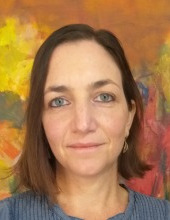
Dr. Sivan Goren-Arzony studies premodern and early modern poetry from South Asia. She received a Ph.D. in Comparative Religion from the Hebrew University (2019) and was a fellow at the Harvard Society of Fellows (2018–2022). Her research uses literature composed in Sanskrit, South-Asia’s cosmopolitan language, and Malayalam, the language of Kerala (a region in South India) to study the foundation and consolidation of South Asian vernacular literary cultures. The main questions that motivate her research are how groups of individuals develop local literature after centuries of confining the composition of expressive texts to the cosmopolitan language, what forms this literature takes, and what inspires it. She mainly works on poetry composed in Rubies and Coral (Maṇipravāḷam), a literary style combining Sanskrit with Malayalam. Her research at Mandel-Scholion focuses on the place of women in this literature, whose early compositions were mostly dedicated to the praise and description of wealthy, local courtesans. Her areas of interest further include the study of women in premodern South Asia, literary theory, South Asian poetics, Kerala’s social history, and translation theory.
Selected Publications:
“I Talk to the Wind: Maḻamaṅgalakkavi’s Maṇipravāḷam Naiṣadhacaṃpū." In Sensitive Readings: The Pleasures of South Asian Literature in Translation, edited by Yigal Bronner and Charles Hallisey, University of California Press, 52–57, 2022.
“On Sanskrit Lotuses and Bhāṣā Lilies: Poetic Flaws in the Līlātilakam.” In Linguistic and Textual Aspects of Multilingualism in South India and Sri Lanka, ed. by Erin Mc’cann and Giovanni Cioti, Pondicherry: École française d'Extrême-Orient, 429–452, 2021.
“Sweet, Sweet Language: Prakrit and Maṇipravāḷam in Premodern Kerala.” In The Indian Economic and Social History Review 58 (1): 7–27. DOI: 10. 1177/0019464620980905, 2021.
“An Actor in Red and White: The Cākyār Community and the Early Maṇiprāvaḷam Corpus.” In Two Masterpieces of Kudiyattam: Anguliyankam and Mantrankam, edited by David Shulman and Heike Oberlin, 306–25. Delhi: Oxford University Press, 2019.

